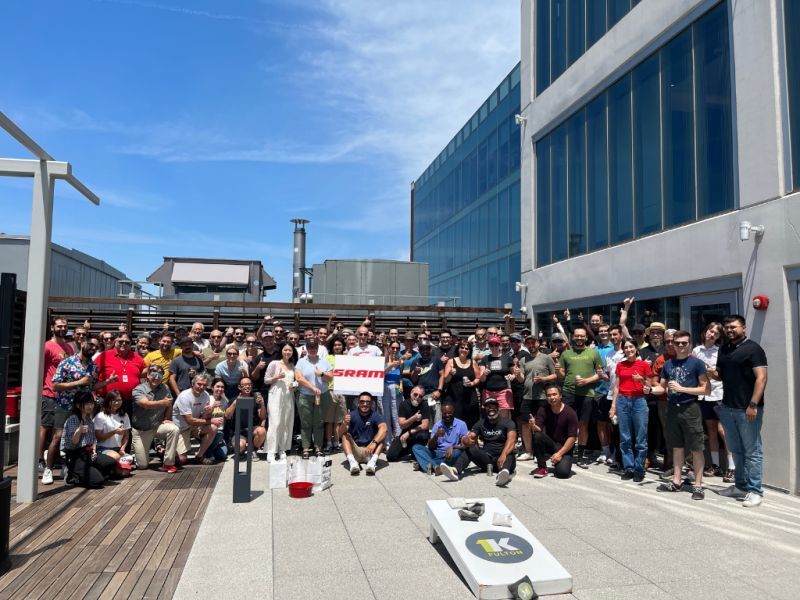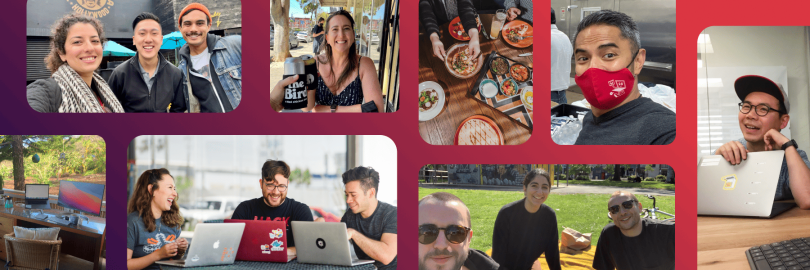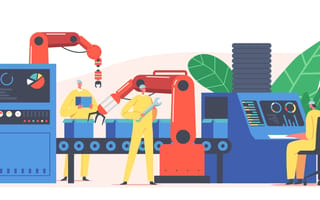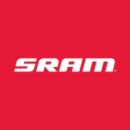Products can make or break a company. The right product can expand a company's customer base, all while sharpening its brand. On the other hand, a less successful product risks draining company resources and failing to connect with customers.
So, what exactly makes a successful product? To find out, we asked five tech teams from national and multinational companies to highlight some of the products they've built from the ground up. These companies represent a variety of industries — including pharmaceuticals and manufacturing — but they all rely on tech teams to develop innovative products that engage customers in new ways.
In order to create new products from scratch, these tech teams had to identify their customers' needs, find actionable solutions and implement them through new technologies. Whether helping customers keep their kitchens well stocked through purpose-built platforms or souping up bicycles with cutting-edge technology, these teams engineered products that made life easier, safer and more integrated than ever before.
Though each product is as unique as the team that built it, they all have something in common: They create a smooth, streamlined customer experience while helping companies define their brand, their goals and the way they engage with the world.

About the company: Ingredient manufacturer-distributor Dawn Foods launched its Boston-based Digital Innovation Hub in 2019 to expand the company's digital footprint and equip customers with more tools, such as user-friendly ordering systems.
Gireesh Sahukar, VP Digital, on Dawn Foods' e-commerce platform: "The most important project that our digital team has built is Dawn Foods' e-commerce platform. We had the amazing opportunity to have a blank canvas to develop the best fit for the organization, with the most future-forward tech available. We were able to choose 'the what, the how and the with whom' when we built our e-commerce platform. We were one of the first in the tech industry to go with a headless architecture with a MACH/composable approach, which gave us the needed flexibility for a prompt and efficient platform development. Our e-commerce platform was built in 21 weeks, and we release 10-15 feature upgrades every four weeks. Every day, we make our e-commerce platform stronger with our Voice of the Customer program, which allows us to receive real-time input from our customers that we translate into upgrades to the site.
"This development is important because it gave a centennial company the opportunity to innovate and bring forward-thinking digital tools to its customers. So far, we have accomplished a 50 percent conversion rate, and our customers love having the convenience of ordering 24/7, resulting in 5 percent more orders per day."
Cities where Dawn Foods is currently hiring for tech roles: Boston and remote for key, specific roles

About the company: SRAM, a Chicago-based bicycle manufacturer founded in 1987, is expanding the use of technology in its products. In late 2021, the company acquired Hammerhead, a cycling computer brand.
Sang Kim, Manager of Electrical and Software Engineering, on SRAM's AXS platform: "The most important project our team at SRAM has built from the ground up was the AXS platform we use in our connected electronic/software products. It was a significant advancement that required collaboration across several product lines, enabling seamless wireless interaction across SRAM components and even some non-SRAM devices. With the introduction of AXS-enabled products, cyclists can customize their bicycles in an innovative manner. Whether enabling novel bike builds by physically using parts across product lines (using mountain bike parts for 'gravel' bike builds), or digitally customizing their experience through mobile app-enabled advanced features (such as customized shifting and button assignment), AXS-enabled components make it happen. Since the first AXS products were introduced in 2018, we have continued to develop and extend our AXS platform to new, exciting products, such as our Flight Attendant mountain bike suspension system. Our custom, high-reliability wireless platform continues to be the market standard for seamless integration of bike technology."
Cities where SRAM is currently hiring for tech roles: Chicago; Colorado Springs, Colorado; and Spearfish, South Dakota

About the company: As a reservation platform, OpenTable connects over 1 billion diners to restaurants throughout the U.S. and the world.
Lily Samimi, Senior Design Manager, on OpenTable Kit: "In my opinion, one of the greatest projects that the OpenTable product design team has built and continues to iterate on is a centralized design system called OpenTable Kit (OTKit). Because OpenTable is a dual-sided marketplace that reaches diners and restaurants all around the world, OTKit serves as a hub and living language to be used across all products, devices and users. It allows us to be thoughtful about addressing diversity, equity and inclusion needs at scale and unlocks an added benefit of helping our teams build, learn, measure and repeat at a higher velocity. But even more so, OTKit is a key example of the magic that happens when our teams work together toward a shared vision."
Cities where OpenTable is currently hiring for tech roles: OpenTable | KAYAK has a 'Work from (Almost) Anywhere' policy that allows for maximum flexibility, remote work and short-term or permanent changes to where you work. You choose how many days to work from an office, if at all. Our U.S. office footprint includes the following locations: Stamford, Connecticut; San Francisco; Cambridge, Massachusetts; Concord, Massachusetts; Denver; Los Angeles; Miami; and New York.

About the company: Founded in 1984 by Stanford University scientists, IT leader Cisco continues to rely on its talent to find solutions to real-world problems, like the impact of Covid-19 on the global supply chain.
Pallavi Kalapatapu, Principal Engineer, Emerging Technologies & Incubation (ETI) Development Group, on innovations at Cisco: "Earlier in my career at Cisco, my team developed one-button-to-push immersive conference management technology, a ground-up innovation that proved highly successful and led to Cisco Collaboration portfolio expansion through acquisitions like Tandberg and Webex. The next opportunity was building an Enterprise Blockchain platform solving enterprise use cases such as anti-counterfeit product detection, network configuration management and sustainable energy certification management. Although the project dissolved a few years later, it was an incredible experience that led me to the rewarding work I do today — incubating a variety of projects, including inclusion and diversity technology solutions and influencing Webex roadmaps. Working on startup teams while still being able to manage my work-life balance pushes me to continue to work on entrepreneurial projects at Cisco."
Cities where Cisco is currently hiring for tech roles: All around the U.S. and globally. Many of Cisco's roles are hybrid or fully remote.







